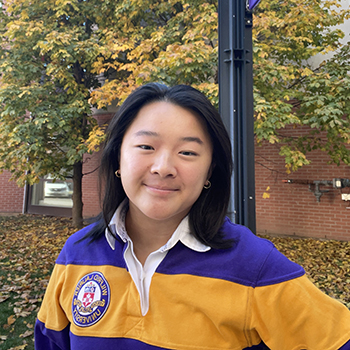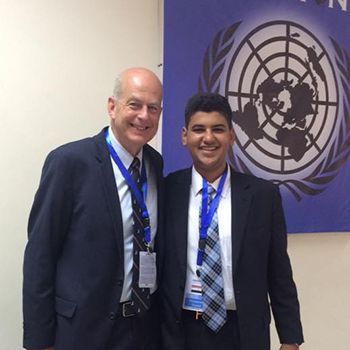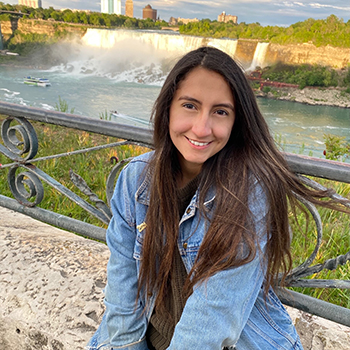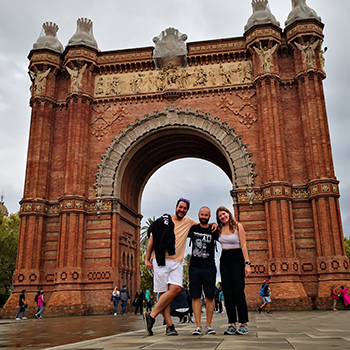Going global with your education can help broaden your horizons as you build diverse connections across cultures, enrich your academic experience and develop intercultural competencies. At Wilfrid Laurier University, there are so many opportunities to gain an international education through exchanges, volunteer opportunities, field courses, research, international-at-home programs and more.

Since I will be going on exchange next year, I wanted to learn about how I could get more involved with global engagement activities right here at Laurier. I’ve been so grateful for the opportunities I’ve had as a Global Engagement Student Ambassador (GESA). I get to represent Laurier in a positive way and have made many friends through my volunteering.
It is sometimes difficult for exchange students to meet and become friends with Canadian students when they are in a bubble of people from their home country. We try to engage with them to help them out of their comfort zone to meet more people. Even saying hi in the hallways or asking someone to grab lunch is a great way to show exchange students that they are welcome at Laurier. During the first weeks of September, we spent a lot of time greeting incoming exchange students and helping them find the One Card office, their classes, the Student Wellness Centre and more.
I think it’s important for students to build intercultural skills because there is so much diversity in the world around us. It’s important to be open-minded and understand that there isn’t just one way of thinking or being. Especially once entering the workforce, we will be faced with so many different people.
I became a GESA because I love travelling and connecting with people from different backgrounds and cultures. Being a GESA is a lot of fun and helps me connect with international students like myself, exchange students, and LEAF (Laurier English and Academic Foundation) students to help them settle in Canada and share my experience with them. I love being a GESA because it helps create a warm and welcoming community for all students to learn, share and grow together.
I have done campus tours with exchange students to show them where their classes are and then go out for coffee after. I have also participated in the Hawk 2 Hawk program, which helped me connect with students from different cultural backgrounds.
I think it's important for students to build intercultural skills to help them understand other cultures and how to connect with others. In addition, it helps with building cultural awareness and mindfulness, which I think are two of the most important aspects needed in the workplace and life in general.


I became a GESA because I wanted to be more involved in international and multicultural opportunities, and it looked a wonderful team to be part of. As a GESA, I have planned movie nights with exchange students and Laurier students, participated in campus tours for exchange students, and hosted drop-ins for students on campus and those abroad to learn about some of the programs Laurier International and global engagement offers.
I am going on an exchange next semester and I’m really happy about it. This new step in my educational career has brought me close to volunteering with Lisa Roy, student abroad advisor. Being part of the GESA team allowed me to make connections with incoming exchange students. I have developed friendships with past Laurier students as well as students currently on exchange.
I believe it is important for students to build intercultural skills as they broaden their understanding about everyday things. These skills can also help students build better relationships and communication with their peers.
Want to continue to be an international ambassador after you graduate? Hear from alumni that are part of the Global Ambassador program in countries all around the world.
Hoping to speak a new language? Want to develop skills beyond a language-learning app? Then join the Tandem Language Program at Laurier. Through the program, students have the chance to improve language skills, make intercultural connections and learn in a social way. Students are matched with other students who have similar language interests and meet every week for a semester.
Don't have English-language skills but still want to participate? Join the Hawk2Hawk English Conversation project. This program matches Laurier students with LEAF program students to have weekly conversations in English, to help LEAF program students practice their language skills in a non-academic setting.
Learn more about Laurier’s language and culture sharing programs.
Explore cultural dimensions that help to bridge, appreciate and leverage differences with Laurier’s Intercultural Certificate. This eight-module program helps students and staff develop intercultural skills, knowledge and attitudes that support lifelong learning.
The Intercultural Certificate is offered once a term and is free for Laurier and exchange students. Students can also receive credit towards their Laurier Experience Record completing the modules.
To celebrate International Education Week, Laurier International has a full week of in-person and online events across both Waterloo and Brantford campuses to provide opportunities for global engagement and highlight ways to participate in future international programming.


Thinking about a future in medicine? Laurier has partnered with the American University of the Caribbean School of Medicine to allow Laurier graduates, including recent alumni, to study in the Doctor of Medicine degree program.
"One piece of advice that I would give to future exchange students is to take advantage of every moment while abroad. The greatest takeaway that I learned from the exchange, and this year in general, is that you never know when things are going to change. That’s why you have to enjoy the now and say yes to as much as you can. Go on that hike even though you’re tired, go to the beach even though it’s far, go make friends even though it can be scary. In the end, it is almost always worth it. I promise."
Read about Bailey Rand's exchange experience in Australia.
"The feeling of loneliness and alienation vanished once the semester started. I started making friends and took Korean classes to learn beginner-level Korean. I became more involved in university events and explored the different cities in South Korea. As the semester went on, I began to enjoy my exchange as I became more familiar with Korean culture and behaviours. I learned to be more opened-minded to different cultures and to know that everyone adjusts to a new setting differently."
Read about Crystal Li's exchange experience in South Korea.
Laurier undergraduate students are eligible to apply for the Queen Elizabeth Scholars program, which includes a three-month internship at a non-profit organization in Ghana. Each scholar will also receive a $6,000 scholarship toward the costs associated with the internship.
Applications for the summer of 2023 are open until Nov. 20, 2022. Undergraduate students in Human Rights and Human Diversity, Social Work, Global Studies, International Education Studies Programs or in the Faculty of Music are given priority, but all students are encouraged to apply.
Laurier researcher Bree Akesson spoke at the UN General Assembly about her book, From Bureaucracy to Bullets: Extreme Domicide and the Right to Home. The book gave the UN Office of the Special Rapporteur on the Right to Adequate Housing inspiration a motivation to draft a UN report on the topic.
Laurier professor Robert McLeman was the lead author of Chapter 7 of The United Nations’ Intergovernmental Panel on Climate Change’s new report “Climate Change 2022: Impacts, Adaptation and Vulnerability.” This report is a comprehensive and far-reaching look at the impacts of climate change on the natural world and human societies, as well as vulnerabilities and potential adaptations.
Though focused on a diverse range of topics, from gender gaps in education to agriculture in Kenya, Muthoni Nganga’s research is connected by a central motivation: to explain and address inequities. In collaboration with research colleagues at the University of California, Berkeley, she is currently launching a pilot study that will test the viability of interventions aimed at increasing the adoption of agricultural technology by Kenyan female farmers.